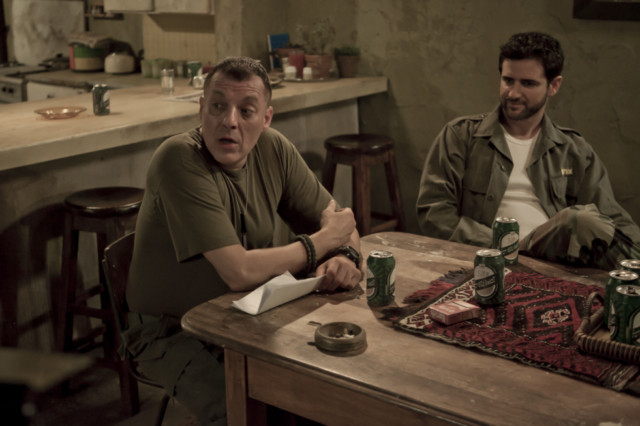
Picture this: an Arab soldier, an American soldier and an Israeli soldier are inadvertently forced into a locked military base together for six hours.
In the real world, it’s anyone’s guess what might happen with all that testosterone bouncing off the walls. In Ziggy Darwish’s feature film debut, Bordering on Bad Behaviour, the result is clear: a combination of chaos, physical altercations, hurt feelings and “politically incorrect” humour.
“I wrote the script, I found an investor, I got two million US dollars (Dh7.3 million), I went to South Africa and we recorded it,” Darwish, an Australian born to Lebanese parents, said of the project. “We filmed a proper full-feature Hollywood movie with an amazing cast.”
Filmed over four weeks, and starring Tom Sizemore of Saving Private Ryan fame, the movie already has a distribution deal in America, with a tentative January release date. Darwish is hoping for a South African theatrical release in October, and says he would love to have a Middle Eastern distributor take it on, as well.
“There’s a lot of heavy content in there that pushes boundaries that a lot of people don’t want to talk about, but [that] we talk about every day in the Middle East,” the Dubai-based scriptwriter said.
Darwish, who has been living in the UAE for eight years and works as a personal trainer — he’s written a fitness book called Cut the Crap & Cut the Crap — considers this his first real foray into filmmaking.
“I consider myself a filmmaker now, purely for the fact that it’s been a year-and-a-half of post-production, which is a very long time. In that time, I’ve learned everything — I’ve been to Cannes, I’ve spoken to everybody who knows movies and films.”
‘We’re not evil people’
After 9/11, the 37-year-old says he noticed that there was a spreading hatred of Arabs and Muslims. Though his friends didn’t turn against him, they did turn against the “whole Arab concept”.
“Story short, this sentiment is all over the world. And Arabs aren’t bad people. The majority of us, we’re actually pretty cool people. We’re fun, we’re hip, we’re innovative, we’re not evil people,” he said. “And the bottom line is: why can’t we just get along?”
Having watched the 2009 film Lebanon, which is based on the Israeli invasion of Lebanon in 1982, Darwish decided to write a script about “three people in a room” — or to be more exact, three sworn enemies in a room.
“There’s Tom Sizemore, who’s still a bit of an American icon. To make it real, I had to get real people, so our agent in LA found the No. 1 Israeli actor, his name is Oz Zehavi,” Darwish said. “And I couldn’t find any Australian-Arab actors, so we had to get a famous Australian [Bernard Curry].”
In the film, the Australian-Arab soldier, Baz, unintentionally walks past the Israeli-Lebanese border and enters into a top-secret Israeli communication base. When he finds Bob, the American solider, he knocks him out with a punch to the face. He does the same to Ari, the Israeli soldier, with a choke-hold.
When the soldiers come back to consciousness, the adventure unravels.
“Without giving too much, let’s just say things are said that shouldn’t be said, emotions are let out, truths are told, old pains are thrown on the table, a few fights and some good food,” Darwish said.
A different jargon
Having experience in the Royal Australian Navy himself, he believed that the story would flow better from the point of view of military personnel.
“Being a military man myself — I served years in the Royal Australian Navy, and I’m still a reservist in the Royal Australian Navy — I thought to myself when I wrote this, you know: as a civilian, or as three normal guys in a room, people are going be like, ‘Ah, whatever! They’re just three guys with three perspectives,’” he explained. “But a military man is on the front the line. He sees beyond the politics. He’s the hands-on person.
“Because military guys have a different jargon, they can kind of get away with saying things that normally people would be offended by.”
But even the real life cast wasn’t immune to some of the controversial topics and critical viewpoints touched upon in the script. According to Darwish, Zehavi, a Tel-Aviv resident, found parts of the script particularly difficult to swallow.
“He was very hurt, but in saying that, wow — his performance,” Darwish recalled. “Even Tom Sizemore’s agent signed him up after the film was shot. His performance blew everybody away, because he was passionate and really angry and we got this amazing performance out of him, like — real tears. Real drama on the set.”
And as for Sizemore himself? He brought nothing less than greatness. “Tom Sizemore is a true gentleman, professional Hollywood superstar,” Darwish gushed. “He was very cool.”













